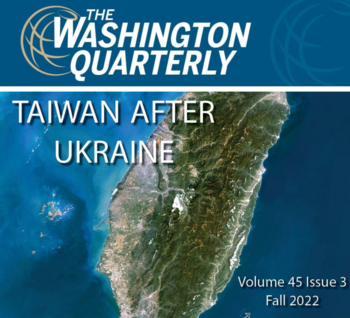This commentary was first published by the Los Angeles Times.
The 104-minute speech by Chinese President Xi Jinping at the country’s 20th party congress reveals a leader who believes he is on a historic mission to save China’s self-described socialism in the 21st century.
Xi’s Oct. 16 speech launched the twice-a-decade meeting, which concludes this weekend, where the national Communist Party appoints its leadership and announces China’s policy direction for the coming years. The address reads very much like a sequel to his previous one five years ago. At that time, Xi cryptically said China had entered a “new era” of socialism. This time, he characterized his aim as “building a modern socialist country,” which the state media touted as the highlight of the speech. This statement clarifies his ambition to prove the superiority of socialism by 2049, with an implicit aim to surpass the U.S. by the centennial anniversary of the People’s Republic of China’s founding in 1949.
Xi is driven by the grand “Chinese dream,” the “great rejuvenation of the Chinese nation” that he referenced in his 2017 and 2022 National Congress speeches. He appears to view himself as the sole individual who can achieve this dream in the 21st century, perhaps casting himself as a 21st-century Mao Zedong. His plans — including “common prosperity” and “socialist modernization” — are long term and unlikely to shift even following the recent turmoil caused by COVID-19, China’s harsh lockdowns in response and the resulting economic pains.
These ambitions are the same ones promoted by the Xi administration over the last decade. But by the end of this latest congress, Xi will have cemented an unprecedented third term as president, and he can now be more aggressive than before in their pursuit.
Subscribe to APARC newsletters to receive our experts' commentary and analysis.
It follows then that U.S.-China relations are unlikely to improve in Xi’s next term. He has shown, time and again, that he differs from his predecessors, except Mao, in that he does not shy away from conflict with the United States. Xi has felt comfortable declaring that “the East is rising while the West is declining” and positioning the U.S. as a challenge to overcome, rather than an obstacle to avoid, on the road to the Chinese dream.
On the other hand, China will probably strengthen ties with Russia, North Korea and other like-minded authoritarian nations, just as the U.S. is strengthening alliance networks in the region, including with Japan and South Korea. We are, as Henry Kissinger once said, in the “foothills of a Cold War.”
The Taiwan Strait remains central to how quickly and drastically conflict could escalate. Xi’s latest speech reiterated that China wanted to gain Taiwan peacefully but “will never promise to renounce the use of force, and we reserve the option of taking all measures necessary.” He frames unification not as a choice but as a historical responsibility, which has been placed on his shoulders. Xi’s direct mention of Taiwan unification at the party congress suggests that he will use that issue as a justification for his long-term reign.
One factor that will help determine the actual longevity of Xi’s rule is whether meaningful protests against him will emerge. Xi’s policies and crackdowns against dissent have yielded sporadic protests that made international headlines. In China, however, the threshold for revolution is quite high, creating major barriers to a regime change. A large dose of state-led nationalism and indoctrination convinces people that the U.S. in particular is determined to torpedo China’s quest for modernity, creating an enemy to rally the country around.
China’s economic challenges pose another hurdle for Xi’s long-term agenda. The country’s rigid zero-COVID policy has limited growth, and Xi has displayed a heavy-handed approach toward private businesses, dampening entrepreneurial spirit. If Chinese people come to think of Xi’s anti-market tendency as the underlying problem, it will erode his authority.
To stave off such threats, Xi is likely to continue his iron-fist rule. He has purged enough rivals and earned enough grievances over the years that relaxing his power grip at this juncture will likely invite criticism, if not revenge, toward him. He is eager to turn China into a global power that will awe the West. As Xi put it at the 2017 party congress, China is increasingly taking “center stage in the world.” With Xi still at the helm, we should expect a more aggressive China and increasing turbulence in the regional and global order.
Gi-Wook Shin is the director of the Shorenstein Asia-Pacific Research Center at Stanford University. Seong-Hyon Lee is a senior fellow at the George H. W. Bush Foundation for U.S.-China Relations.










